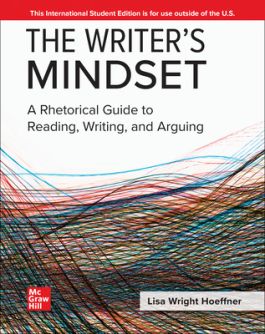Writer's Mindset ISE
1st Edition
126451087X
·
9781264510870
© 2022 | Published: August 9, 2021
To become good writers, students must learn more than a writing process: they must develop a writer’s mindset—the rhetorical skills to read critically, analyze and synthesize sources, and write with their audiences in mind. How can we help studen…
Read More
Request Review Access
Receive via shipping:
- Colour, print bound version of the complete text
PART 1 DEVELOPING A WRITER’S MINDSET
1 What Is a Writer’s Mindset?
2 Reading with a Writer’s Mindset
3 Composing with a Writer’s Mindset
4 Using Rhetorical Patterns as Tools
PART 2 WRITING PURPOSES
5 Writing to Reflect
6 Writing to Inform
7 Writing to Analyze
8 Writing to Evaluate
9 Writing to Persuade
PART 3 RESEARCH STRATEGIES
10 Conducting Research
11 Using Sources Accurately and Ethically
12 Documenting Sources in MLA and APA Style
PART 4 ARGUMENTS IN DEPTH
13 Recognizing Arguments
14 Analyzing an Argument’s Elements
15 Understanding an Argument’s Appeals
16 Recognizing Fallacies
17 Writing a Rhetorical Analysis
18 Classical, Rogerian, and Visual Arguments
PART 5 WRITING A RESEARCHED ARGUMENT
19 Planning an Argument
20 Selecting Evidence and Drafting Reasons
21 Drafting Counterarguments, Intro¬ductions, and Conclusions
22 Revising and Finishing Your Argument
PART 6 AN ANTHOLOGY OF READINGS
PART 7 HANDBOOK OF READING AND WRITING SKILLS
1 Improving Your Reading Skills
2 Improving Your Writing Skills
1 What Is a Writer’s Mindset?
2 Reading with a Writer’s Mindset
3 Composing with a Writer’s Mindset
4 Using Rhetorical Patterns as Tools
PART 2 WRITING PURPOSES
5 Writing to Reflect
6 Writing to Inform
7 Writing to Analyze
8 Writing to Evaluate
9 Writing to Persuade
PART 3 RESEARCH STRATEGIES
10 Conducting Research
11 Using Sources Accurately and Ethically
12 Documenting Sources in MLA and APA Style
PART 4 ARGUMENTS IN DEPTH
13 Recognizing Arguments
14 Analyzing an Argument’s Elements
15 Understanding an Argument’s Appeals
16 Recognizing Fallacies
17 Writing a Rhetorical Analysis
18 Classical, Rogerian, and Visual Arguments
PART 5 WRITING A RESEARCHED ARGUMENT
19 Planning an Argument
20 Selecting Evidence and Drafting Reasons
21 Drafting Counterarguments, Intro¬ductions, and Conclusions
22 Revising and Finishing Your Argument
PART 6 AN ANTHOLOGY OF READINGS
PART 7 HANDBOOK OF READING AND WRITING SKILLS
1 Improving Your Reading Skills
2 Improving Your Writing Skills
To become good writers, students must learn more than a writing process: they must develop a writer’s mindset—the rhetorical skills to read critically, analyze and synthesize sources, and write with their audiences in mind. How can we help students with the challenges involved in thinking like a writer? By using incremental steps that move from literal thinking to analytical and critical understanding, The Writer’s Mindset 1e makes the development of college-level writing capabilities possible for all students, whatever their level of preparedness.
The Writer’s Mindset provides students with tools to transform the way they approach reading, writing, and arguing through five key pillars:
• Rhetorical Focus
• Incremental Approach
• Embedded Support
• Student Appeal
• Instructor Support
The breadth of coverage allows the text to be used in both semesters of Composition, including Composition sections tied to a Co-Requisite or ALP course, which makes this an excellent choice for 2-year schools. It also includes MLA 9e updates. Target opportunities using Everyone’s an Author, Everything’s an Argument, or Writing in the Works.
The Writer’s Mindset provides students with tools to transform the way they approach reading, writing, and arguing through five key pillars:
• Rhetorical Focus
• Incremental Approach
• Embedded Support
• Student Appeal
• Instructor Support
The breadth of coverage allows the text to be used in both semesters of Composition, including Composition sections tied to a Co-Requisite or ALP course, which makes this an excellent choice for 2-year schools. It also includes MLA 9e updates. Target opportunities using Everyone’s an Author, Everything’s an Argument, or Writing in the Works.

